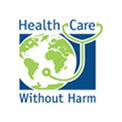Transforming health care’s supply chain with a climate excellence standard
By Kathy Gerwig and Keith Edgerton
The climate crisis is a public health crisis, and the health sector is extremely vulnerable to its impacts. Rising temperatures, severe weather events, and air pollution are causing an increase in illness and injuries and affecting millions across the globe — especially among vulnerable populations such as children, older adults, those with chronic illness, and underserved communities. These challenges are compounded by infrastructure vulnerabilities and supply chain disruptions which put an increased burden on health care facilities during crises.
The U.S. health care sector is responsible for 8.5% of the country’s total greenhouse gas (GHG) emissions and has a collective responsibility to drastically reduce this impact on public health. Supply chain contributes around 50% of a typical hospital’s emissions due to purchasing and distributing goods and services such as pharmaceuticals, chemicals, medical devices, and supplies.
The actions required to confront the climate crisis represent the greatest opportunity to improve public health. Many health care systems and their major suppliers have adopted aggressive goals to cut their emissions. And meeting those goals requires significant and rapid reductions in supply chain emissions.
Creating a standard of excellence for health sector suppliers
With growing interest in reducing emissions in the global supply chain and accelerating momentum to decarbonize the health sector, Health Care Without Harm and its U.S. Health Care Climate Council developed a new Climate Excellence Standard for Health Sector Suppliers.
The standard defines superior performance in decarbonization on the part of individual suppliers to ensure the health care supply chain is aligned with achieving robust near-term GHG emissions reduction in alignment with net-zero emissions by 2050.
The standard was created with input and direction from Health Care Without Harm’s Health Care Climate Council — a group of 19 leading health systems representing over 550 hospitals and 9,500 health centers in 45 states, with more than 1.2 million employees serving over 77 million patients annually. Health Care Without Harm worked through the council to identify the largest medtech suppliers of their hospitals and health systems. The suppliers were contacted and involved in the process through interviews, surveys, and roundtable discussions. As a result, the standard was developed based on shared expertise and the need for a consistent definition of excellence across the sector.
After the standard was established, Health Care Without Harm performed an initial evaluation on the 15 top medtech suppliers that provide services to the health system members of the Health Care Climate Council. One of those suppliers, Cencora (formerly AmerisourceBergen), achieved the standard, and additional suppliers are being evaluated and engaged.
Health sector supply chain engagement and beyond
The U.S. health care sector reflects nearly 20% of the economy. Spending on products and services totals billions of dollars annually. While strategic partnerships between suppliers, health systems, and group purchasing organizations (GPOs) have been in place for some time, most have yet to feature climate action and emissions reductions in meaningful ways.
The climate crisis has created the opportunity for a new approach. Progress has been made in the past on supplier requirements such as avoiding the use of toxic chemicals, ensuring recyclability of products, or reducing packaging. New collaborative efforts are about suppliers, GPOs, and health care delivery systems achieving more together versus a typical seller-and-purchaser relationship, allowing for deeper reductions in supply chain emissions.
Health Care Without Harm’s hope for the future is that health systems and their GPOs embed the provisions of the Climate Excellence Standard for Health Care Suppliers into requests for information, requests for proposals, and contracts — as well as their product selection weighting — so product or supplier selection is informed by emissions performance. This will help standardize language in procurement documents, something suppliers strongly favor.
The standard can also serve as a model to be adopted by climate/health nonprofits, academic institutions, government agencies, national health programs, and supply chain collaboratives that are pursuing supply chain decarbonization.
Health Care Without Harm is also ensuring coordination with the standard to provide a unique value proposition and align efforts toward greater impact. The organization is involved with the National Academy of Medicine’s Action Collaborative on Decarbonizing the U.S. Health Sector and its work group focused on supply chain decarbonization. Health Care Without Harm is also participating in the newly formed collaborative Collective Healthcare Action for Reducing MedTech Emissions (CHARME). These efforts allow for future iterations of the standard to be complementary to the insights gained from these groups.
To combat the health crisis caused by the climate emergency, immediate and decisive action is crucial to reduce emissions in the health sector supply chain. We must define excellence to accelerate action by setting clear, consistent, and compelling targets — and we continue to evolve that definition. We must engage in deep collaboration across the supply chain and foster closer partnerships between health systems and suppliers. The time for action is now, and we must act with urgency.
Want to learn more about how health care procurement can accelerate supply chain decarbonization?
Join us for CleanMed May 21–23 in Salt Lake City. Along with our session about the Climate Excellence Standard for Health Sector Suppliers, CleanMed offers many opportunities to learn how to measure and reduce emissions and advance sustainability and climate resilience at your organization.
Kathy Gerwig is a Health Care Without Harm advisor on supply chain decarbonization and author of the book “Greening Health Care, How Hospitals Can Heal the Planet.”
Keith Edgerton is Health Care Without Harm’s director of climate solutions.
